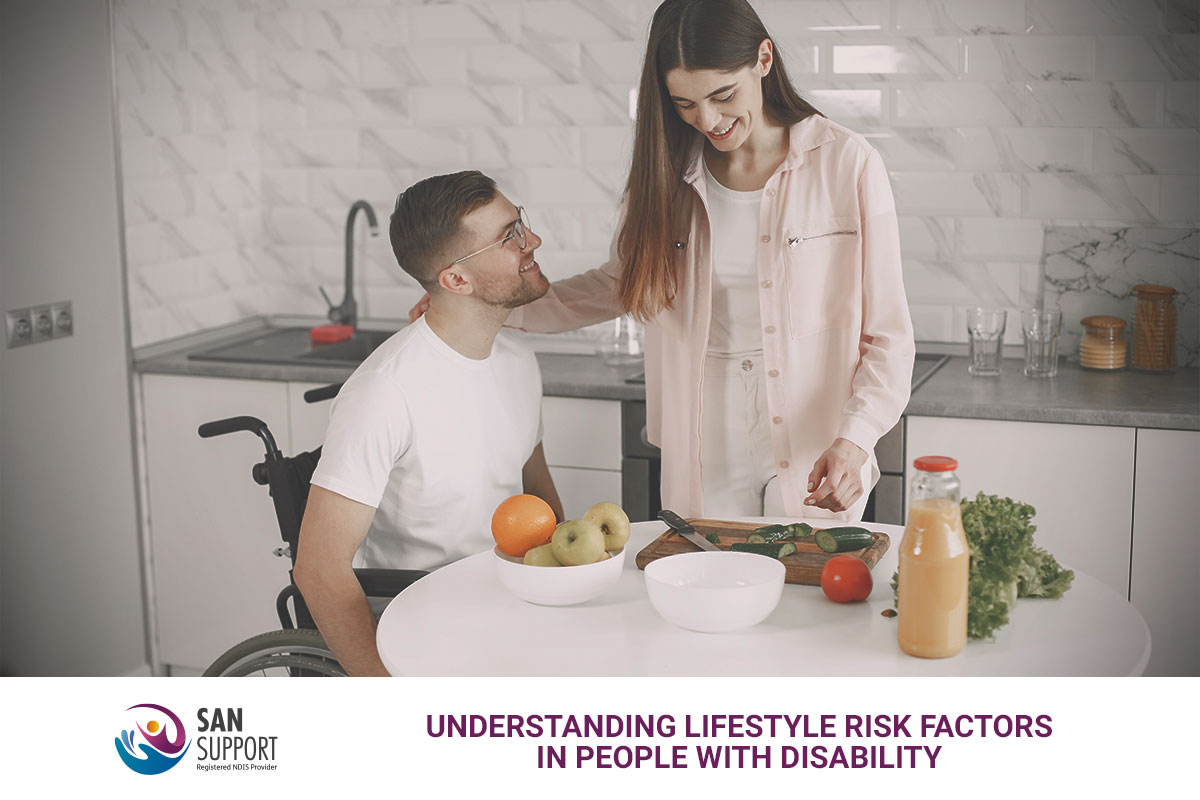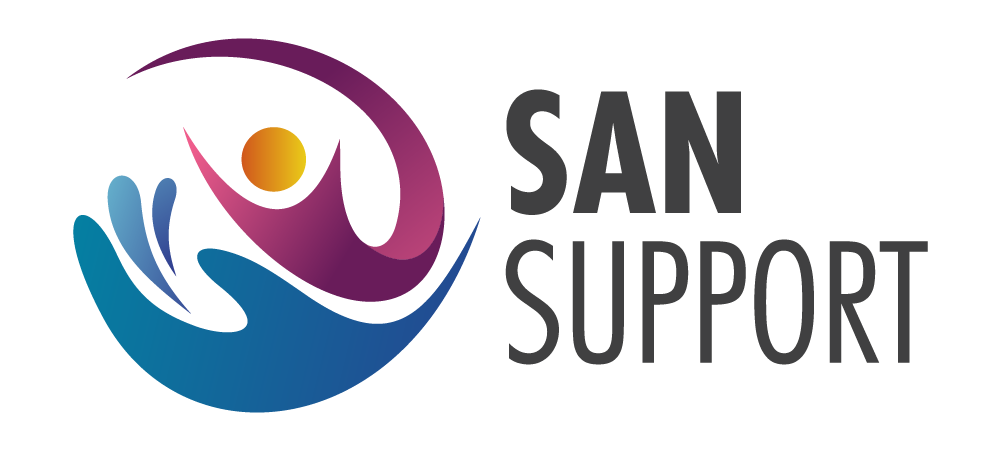
People living with disability in Australia face higher health risks but with the right support, many of these risks are preventable. As, a registered NDIS provider, we help participants address lifestyle risk factors and promote long-term wellbeing through tailored disability support services.
According to the Australian Institute of Health and Welfare (AIHW), people with disability are 3.6 times more likely to die from preventable health conditions than the general population. Much of this gap comes from limited access to preventative healthcare and higher rates of modifiable lifestyle risk factors.
In this guide, we explain:
- What lifestyle risk factors are
- Why they impact people with disability more
- The barriers that make lifestyle change difficult
- How NDIS support services like SAN Support can help address these challenges
Whether you are an NDIS participant, support coordinator, carer or allied health professional, understanding these risk factors is key to improving outcomes.
What Are Lifestyle Risk Factors?
Lifestyle risk factors are habits, behaviours or physical conditions that increase the likelihood of developing chronic illness or worsening an existing condition. These risks are considered modifiable, which means that with the right intervention and support, individuals can reduce or eliminate them.
There are two main categories:
Behavioural Lifestyle Risk Factors
These are health behaviours that individuals can directly influence, including:
- Smoking
- Unhealthy diet
- Physical inactivity
- Insufficient sleep
- Excessive alcohol intake
- Loneliness or social isolation
Biomedical Lifestyle Risk Factors
These are health-related bodily states that result from behavioural and environmental factors:
- Obesity or being underweight
- High or low blood pressure
- Abnormal blood cholesterol or lipid levels
Changing these behaviours and addressing related health conditions can significantly reduce the risk of chronic illness, disability and premature death.
The Impact of Lifestyle Risk Factors on People with Disability
People with disability in Australia experience a higher burden of chronic disease and avoidable hospitalisations many of which are linked to modifiable lifestyle risks.
Recent statistics from AIHW (2024a) show that compared to the general population:
- 74% of people with disability are physically inactive (vs. 71%)
- 55% do not consume enough fruits and vegetables (vs. 51%)
- 8.3% drink sugary beverages daily (vs. 5.6%)
- 14% smoke daily (vs. 9.1%)
These factors contribute to serious health issues including:
- Cardiovascular disease
- Type 2 diabetes
- Cancer
- Mental health conditions such as depression and anxiety
- Respiratory illness
- Dementia and cognitive decline
NDIS participants often face complex, interconnected health challenges making it essential to address both behavioural and biomedical risks through comprehensive support.
Barriers to Healthy Lifestyle Choices for People with Disability
Many lifestyle risk factors can be managed or changed but for people with disability, there are unique and often significant barriers to doing so. These challenges may be physical, emotional, environmental or systemic.
Barriers to Healthy Eating
- Side effects from medications that increase appetite
- Dependence on support workers or carers for meal preparation
- Limited access to fresh food or supermarkets
- Inaccessible kitchen facilities or shared housing
- High cost of nutritious food
Barriers to Physical Activity
- Mobility impairments or chronic pain
- Fear of injury or past trauma
- Need for assistance or adaptive equipment
- Lack of transport or community programs
- Low motivation due to mental health issues
Barrier to Avoiding Alcohol, Smoking and Substance Use
- Comorbid mental illness
- Cognitive or neurological disabilities
- Limited access to behavioural support or therapy
- Lack of meaningful engagement or community participation
- Financial stress and social isolation
Barriers to Social Inclusion
- Loneliness and reduced social networks
- Difficulty accessing community activities
- Unemployment or lack of inclusive services
These barriers show why standard health promotion strategies often fall short for people with disability and why person-centred, disability-specific interventions are necessary.
How to Manage NDIS Participants Lifestyle Risk Factors
As a trusted NDIS provider in Australia, SAN Support offers holistic disability support services designed to improve health and wellbeing. We work closely with participants, families and support workers to reduce lifestyle risks and build healthier daily routines.
Setting Achievable Health Goals
We help participants start small such as reducing sugar intake or taking short daily walks and gradually build confidence through positive reinforcement and ongoing support.
Encouraging Community Participation
We assist participants to join inclusive health-promoting activities like:
- Cooking classes
- Gardening programs
- Walking groups
- Social and recreational events
These not only promote physical health but also improve mental wellbeing and social connection.
Supporting Informed Decision-Making
We empower individuals to understand their health risks and make informed lifestyle choices. Our support workers use accessible communication methods to explain health education tailored to disability needs.
Creating Supportive Environments
We work with participants to create home environments that encourage healthier habits. This might include:
- Reorganising pantries with healthy food options
- Planning meal routines
- Supporting structured activity schedules
Facilitating Access to Allied Health Services
Through the NDIS, we help connect participants with:
- Dieticians
- Physiotherapists
- Occupational therapists
- Mental health professionals
This multidisciplinary approach ensures individuals receive specialised support to address biomedical risk factors.
Encouraging Preventative Healthcare
We support participants to book and attend annual health assessments and check-ups, helping detect issues early and improve long-term health outcomes.
Building a Healthier Future with the Right Disability Support
Reducing lifestyle risk factors is not only about preventing disease it is about increasing independence, building confidence and improving quality of life.
At SAN Support, we believe every NDIS participant deserves the opportunity to live well. Our team provides personalised support that respects each person’s choices and circumstances while guiding them toward a healthier, more connected life. If you are looking to support a loved one with disability, coordinate NDIS service or make positive lifestyle changes, SAN Support is here to help. Our mission is to build healthier communities, one person at a time.
